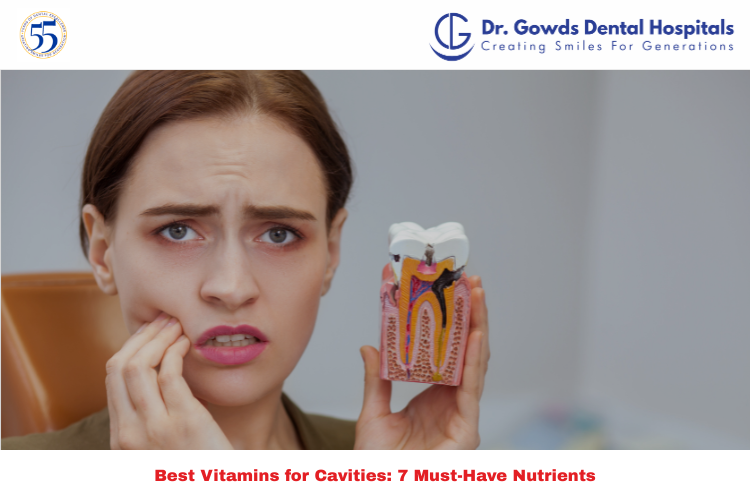Schedule Appointment



Taking care of your teeth is about more than just brushing and flossing regularly. Not saying you can slack there. But if you think that’s all it takes to keep cavities away, you’re missing a huge part of the picture. What you eat—and more specifically, the nutrients you’re getting (or not getting)—can seriously make or break your oral health.
There are a handful of vitamins for cavities that actually help your body fight off tooth decay. And no, this isn’t some crunchy, woo-woo health tip—it’s legit science. So let’s talk about the best vitamins for cavities, how they actually work, and how to sneak more of them into your life without going full-on health nuts.
In the simplest terms: cavities are tiny holes in your teeth caused by acid. That acid comes from bacteria in your mouth, and those bacteria love sugar. When you eat sugary or starchy stuff (even bread or pasta), the leftover bits stick to your teeth. The bacteria chow down, produce acid, and that acid wears down your enamel. Boom—cavity.
Yes, brushing helps. Flossing too. But even with the best oral hygiene routine, if your body’s not getting what it needs to protect and rebuild your teeth from the inside out, you’re still at risk.
Think of your mouth as a little ecosystem. Your teeth and gums need certain nutrients to stay strong, repair damage, and fight off bacteria. If you’re low on those nutrients, your mouth is basically running on fumes.
Here’s what the right vitamins and minerals help with:
Let’s break down which vitamins for cavities do what—and where to find them.
This one’s huge. Vitamin D helps your body absorb calcium. Without it, all that calcium you’re eating might as well be going down the drain. If you’re low on D, your teeth can get weaker, plain and simple.
Sources: sunshine (yep), salmon, fortified milk, supplements if needed.
Why it matters: helps your body actually use calcium to strengthen enamel.
2. Calcium – The Obvious One
You already know this, but it’s worth repeating: calcium builds strong teeth and bones. No calcium = soft enamel. Soft enamel = easy target for cavities.
Sources: dairy (milk, yogurt, cheese), leafy greens, almond milk if it’s fortified.
Why it matters: gives your teeth the structure and support they need to resist decay.
3. Vitamin C – Not Just for Colds
Vitamin C is huge for your gums. Bleeding gums? Swollen gums? Could be a vitamin C thing. It helps your tissue heal and keeps your immune system on point.
Sources: oranges, strawberries, bell peppers, kiwi.
Why it matters: keeps your gums healthy, and healthy gums = better protection for your teeth.
4. Phosphorus – Calcium’s Sidekick
You don’t hear about this one as much, but phosphorus works with calcium to strengthen enamel. It also helps repair minor damage to your teeth before it becomes a full-on cavity.
Sources: meat, eggs, dairy, beans, fish.
Why it matters: helps remineralize enamel and keeps your teeth strong.
5. Vitamin A – For That Saliva Flow
Saliva doesn’t get enough credit. It’s your mouth’s natural defense against acid. Vitamin A helps keep your mouth moist and your mucous membranes working right.
Sources: carrots, sweet potatoes, spinach, liver (if you’re into that).
Why it matters: keeps your mouth hydrated and helps flush out bacteria.
6. Magnesium – The Forgotten One
Magnesium helps your body absorb and use calcium properly. It also helps build strong enamel on its own. Most people are low in this and don’t even know it.
Sources: nuts, seeds, whole grains, leafy greens.
Why it matters: supports enamel strength and keeps your mouth in balance.
The best vitamins for cavities aren’t some magic trick—but they are part of the bigger picture. Your body needs the right tools to protect and repair your teeth, and those tools come from the food you eat. Vitamin D, calcium, C, phosphorus, A, and magnesium—they’re not fancy, but they work.
Combine solid nutrition with good habits, and you’ll be way ahead of the game when it comes to keeping your teeth healthy for the long haul.
Visit us at–
Not really. They help a ton, but brushing, flossing, and regular checkups still matter.
Most adults need 600–800 IU a day. But everyone’s different—ask your doctor.
Nope. Food wins every time. Supplements are just a backup if needed.
No. It helps your gums, but once you’ve got a cavity, you need a dentist.
Both matter. Fluoride protects the outside of your teeth. Vitamins help from the inside.